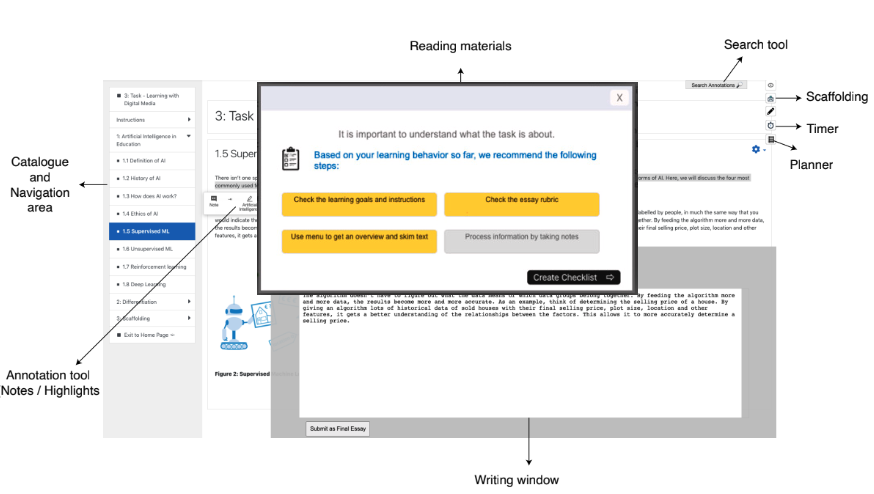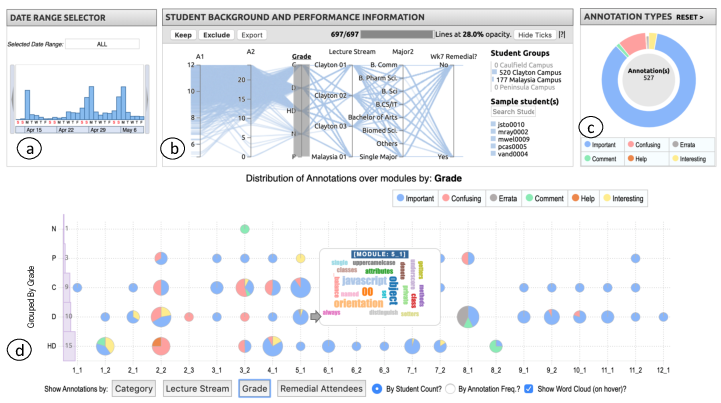Competitive Grants & Funding
| 2021 | Industry Seed Funding Scheme, Monash FIT. "Analysing indoor positioning traces to understand classroom dynamics". CIs: Roberto Martinez-Maldonado, Dragan Gasevic, Shaveen Singh, Joanne Deppeler, Deborah Corrigan and Kathleen Aikens. $24,568 AUD |
| 2020 | FIT PhD Supplementary Funding Scheme. ($850 AUD) |
| 2019 | AIED 2019 Conference Travel Scholarship, Chicago, USA. ($500 USD) |
| 2016 | Monash Graduate PhD Scholarship ($86,285 AUD) |
| 2016 | Monash Faculty of IT – Merit-based Tuition Scholarship. ($157,486 AUD) |
All Projects
 PolyFeed
PolyFeed
PolyFeed Role: Researcher, Development Guidance (08/2023 - 06/2024)
PloyFeed is a feedback management system that sits between the teachers and students. While the system enables teachers to provide personalised, well composed, clear and concise feedback to students, students are able to manage feedback received from multiple sources for multiple modules through a single platform.
[Project Website] [Conference Award - Polyfeed Team]
 Large-scale multimodal knowledge management: From organization and user modeling to fast contextual presentation
Large-scale multimodal knowledge management: From organization and user modeling to fast contextual presentation
KMASS Role: Development Team Leader (06/2023 - 06/2025)
This project aims to develop a fast and scalable system that organises knowledge efficiently, captures local knowledge effortlessly, and delivers contextualized knowledge economically. This system can provide valuable support for various tasks in a collaborative work environment, including training, knowledge transfer, content creation, team management, and evaluation. Potential collaborators for this project may include higher education institutions, intensive-care units, or emergency response services, particularly those dealing with multi-modal data, high staff turnover, time-sensitive operations, and policy-driven requirements.
[Project Website] [ Project Overview]
 Academic Analytics @ Monash
Academic Analytics @ Monash
ADE Role: Researcher, User Interface Designer (Mid 2020 - 2021)
With the goal to support better uses of data for the enhancement of educational quality and student experience at Monash University, a university-wide consultations was carried out to involve key stakeholders in a co-design process of analytics tool development and implementation strategy. Thirty-one participants, made of Deputy/ Associate Deans in Education and their senior management teams, from all the ten faculties participated in the interviews. The report highlighted key areas for consideration when planning next steps for the institutional development of academic analytics, including strategic planning and wider consultations with other stakeholders. The team also proposed comprehensive blueprints for both the development and execution of possible analytics tools.
[ Research Paper]
 CRC-P: Smart Linings for Pipe and Infrastructure Project (Decision Tool)
CRC-P: Smart Linings for Pipe and Infrastructure Project (Decision Tool)
Monash Pipe Evaluation Platform is designed to assist asset managers, project managers and liner installers by: i) Providing a tool to rank pipes by their likelihood of failure; ii) Assessing the condition of the ranked pipes; iii) Recommending suitable types of liners; and iv) Calculating the expected life of the lined pipe. Role: UI design, development, testing, and deploying the complete web application on Water Services Association of Australia (WSAA) server. WSAA is the peak industry body representing the urban water industry, with its members providing water and sewerage services to over 24 million customers in Australia and New Zealand. The Australian Government, through the Cooperative Research Centre, provided funding for the Smart Linings for Pipe and Infrastructure Project. The Pipe Evaluation Platform was a key deliverable of this project contributing to 1.2 Sub-Project 1: Intelligent decision tools and standards and 1.5 Sub-Project 4: Implementation and adoption of research. ★The "Smart Linings for Pipe and Infrastructure" project became a Finalist in R&D Excellence Award 2021 presented by the Australian Water Association VIC Branch.
| Link: [ Project Overview ] [ MPEP Platform ] [ Project Report ][ Short Video ] [ Other ]
 FLoRA Project: Advancing Student Support through Personalised Scaffolds
FLoRA Project: Advancing Student Support through Personalised Scaffolds
The FLoRA project explores self-regulated learning with personalised teaching guides and suggestions offered through artificial intelligence technology. The project was a collaboration between Radboud University's Adaptive Learning Lab, the University of Edinburgh in the UK, the Technical University of Munich in Germany, and Monash University in Australia, and used in 5 countries (Australia, Netherlands, Germany, India, and China) by 2000+ students. FLoRA project was funded by DFG, ESRC and NWO as part of the Open Research Area (Call 5) under grant number BA 2044/10-1 | GA 2739/1-1 | MO 2698/1-1. ★ FLoRA was selected in the prestigious EDUCAUSE 2021 Horizon Report as one of six projects out of 141 key technologies and practices, which were voted in to have a significant impact on the future of higher education teaching and learning.
[ Project Website ] [ FLoRA Platform ] [ News Coverage ]
 LearnerFlow: An Instructor-Facing Learning Analytics Dashboard
LearnerFlow: An Instructor-Facing Learning Analytics Dashboard
LearnerFlow Role: Researcher and Lead Developer (2018 to 2020)
The LearnerFlow Tool was an outcome of my doctoral research. This tool was piloted in two courses in S1 2019 (ENG1003 & FIT5145) with approximately 1500 students in the Faculty of IT at Monash University and aimed to support instructors in evaluating their learning designs. Its implementation provided valuable insights into optimising learning experiences for students. ★ The research paper based on this project was Nominated for Best Full Paper Award at The ACM Conference on Innovation and Technology in Computer Science Education (ITiCSE) 2020 .
[ Project Website ] [ Publication ]
 Early Warning System - FSTE Learning & Teaching Project - USP
Early Warning System - FSTE Learning & Teaching Project - USP
EWS Role: Researcher, Conceptualisation and Developer of Version 1 (2013 to 2014)
This project stemmed from my masters research and focused on using trace data to identify early indicators of "at-risk" students and produced various reports that facilitated implementing interventions to support these students and improve their academic outcomes. The tool was implemented in 16 courses (3500+ students) at USP between 2013 to 2016. ★ The impact of this project has featured in a prestigious Q1-ranked journal: Studies in Higher Education.
[Project Website] [ Features ] [ VC-Forum Presentation ]